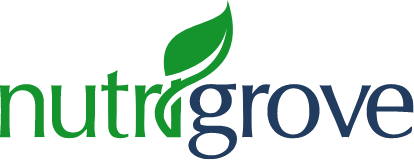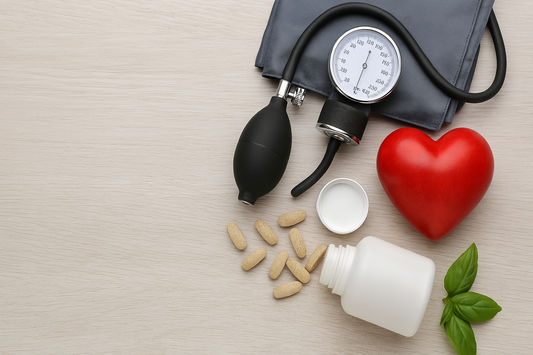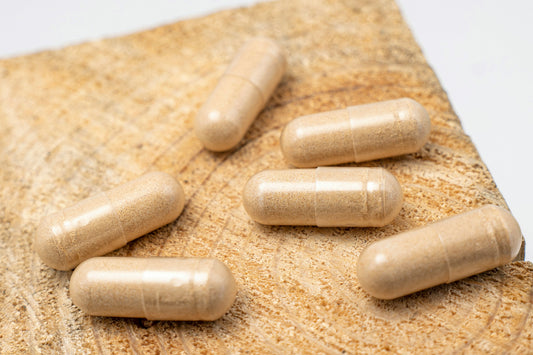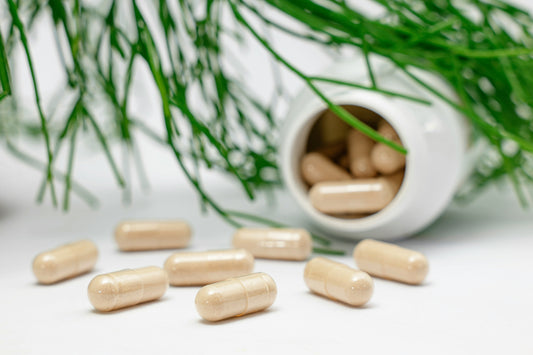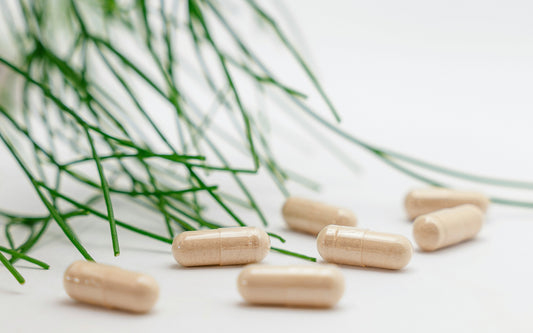Can Hypertension Be Cured Naturally?
Hypertension, or high blood pressure, affects millions of people worldwide, and many are seeking natural remedies to manage this condition and potentially cure it without the use of medication. Studies suggest that lifestyle changes and natural approaches can play a significant role in lowering blood pressure and improving overall cardiovascular health.

- Lifestyle changes such as weight loss, regular exercise, and a healthy diet can help lower blood pressure naturally.
- Reducing salt and alcohol intake, quitting smoking, and managing stress are also effective strategies for managing hypertension.
- Consuming potassium-rich foods, practicing meditation and deep breathing, and considering natural supplements like garlic, L-arginine, vitamin C, and omega-3 fatty acids may have additional benefits.
- It is important to monitor blood pressure regularly and seek support from healthcare professionals and loved ones.
- While natural approaches can be helpful, medication may still be necessary for some individuals to achieve and maintain blood pressure control.
Lifestyle Changes for Hypertension
Making certain lifestyle changes can have a significant impact on managing hypertension and reducing blood pressure levels naturally. Studies suggest that implementing these changes can be effective in helping individuals maintain a healthy blood pressure without relying solely on medication.
One essential lifestyle change is maintaining a healthy weight. Excess weight puts added strain on the heart, increasing the risk of high blood pressure. Regular exercise is also crucial in managing hypertension. Engaging in physical activity for at least 30 minutes a day can help lower blood pressure and improve overall cardiovascular health.
A nutritious diet plays a vital role in blood pressure control. Following the Dietary Approaches to Stop Hypertension (DASH) eating plan, which emphasizes fruits, vegetables, whole grains, lean proteins, and low-fat dairy, has been shown to effectively reduce blood pressure. Additionally, reducing salt intake and limiting alcohol consumption are important dietary adjustments to lower blood pressure naturally.
Recommended lifestyle changes for managing hypertension naturally:
- Maintain a healthy weight
- Engage in regular exercise
- Follow a nutritious diet
- Reduce salt intake
- Limit alcohol consumption
- Quit smoking
- Get enough sleep
- Manage stress
- Monitor blood pressure regularly
- Seek support from family and friends
It's important to note that while these lifestyle changes can be effective in managing hypertension, they may not work for everyone. It is essential to consult with healthcare professionals for personalized advice and treatment options. They can provide guidance on the best course of action, considering individual circumstances and any additional medical conditions. By combining natural approaches with medication when necessary, individuals can take a comprehensive approach to control their blood pressure and improve their overall health.
| Beneficial Lifestyle Changes for Hypertension | Summary |
|---|---|
| Maintain a healthy weight | Excess weight puts strain on the heart and increases the risk of high blood pressure |
| Engage in regular exercise | Physical activity for at least 30 minutes a day helps lower blood pressure and improves cardiovascular health |
| Follow a nutritious diet | The DASH eating plan, emphasizing fruits, vegetables, whole grains, lean proteins, and low-fat dairy, effectively reduces blood pressure |
| Reduce salt intake | Lowering salt consumption helps in blood pressure control |
| Limit alcohol consumption | Alcohol can raise blood pressure, so moderation is key |
| Quit smoking | Smoking damages blood vessels, leading to higher blood pressure |
| Get enough sleep | Adequate sleep plays a role in maintaining healthy blood pressure levels |
| Manage stress | Stress management techniques, such as meditation and deep breathing, can help lower blood pressure |
| Monitor blood pressure regularly | Regular monitoring helps in tracking blood pressure levels and making necessary adjustments |
| Seek support from family and friends | Having a strong support system aids in managing hypertension and maintaining motivation |

Natural Supplements for Lowering Blood Pressure
Incorporating natural supplements into your daily routine, along with lifestyle changes, could be an effective way to lower blood pressure naturally. Certain natural substances have been found to have potential benefits in managing hypertension. While these supplements may not replace the need for medication in all cases, they may provide additional support for blood pressure control.
One natural supplement that has shown promise in reducing blood pressure is garlic. Garlic contains compounds that have been found to have vasodilatory and antihypertensive effects. It may help relax blood vessels and improve blood flow, leading to lower blood pressure levels. A great daily supplement for High Blood Pressure is NutriGrove Blood Pressure Support and NutriGrove Organic Beet Root. Don't forget to add green with NutriGrove Organic Greens Super Food.
L-arginine is another natural supplement that has been studied for its potential effects on blood pressure. L-arginine is an amino acid that plays a role in the production of nitric oxide, a compound that helps dilate blood vessels. Some studies have shown that L-arginine supplementation may lead to a modest decrease in blood pressure, particularly in individuals with hypertension. However, more research is needed to fully understand its effectiveness and safety.
| Natural Supplement | Potential Benefits |
|---|---|
| Garlic | Vasodilatory and antihypertensive effects |
| L-arginine | Possible reduction in blood pressure levels |
Vitamin C, an essential nutrient with antioxidant properties, may also have a positive impact on blood pressure. Studies have suggested that vitamin C supplementation may help lower both systolic and diastolic blood pressure, particularly in individuals with hypertension. It's important to note that while vitamin C is generally safe in recommended doses, high doses may cause digestive upset in some individuals.
Omega-3 fatty acids, commonly found in fatty fish and certain plant sources, have been studied for their potential benefits in cardiovascular health. Omega-3 fatty acid supplements may help lower blood pressure, reduce inflammation, and improve overall heart health. However, it's recommended to consult with a healthcare professional before starting any supplements, as they may interact with certain medications or have other potential side effects.
Remember, while natural supplements can be a valuable addition to a healthy lifestyle, they should never replace medical advice or prescribed treatments. It's essential to work closely with your healthcare provider to find the best approach for managing your blood pressure and overall health.
Including potassium-rich foods in your diet can be an excellent natural strategy for lowering blood pressure levels. Potassium is an essential mineral that helps regulate fluid balance and supports proper muscle and nerve function. Research suggests that increasing potassium intake can help counteract the effects of sodium on blood pressure and promote overall cardiovascular health.
When it comes to potassium-rich foods, there are a variety of delicious options to choose from. Bananas, oranges, avocados, spinach, sweet potatoes, and tomatoes are all excellent sources of potassium. By incorporating these foods into your meals and snacks, you can not only enhance the flavor but also provide your body with an important nutrient that supports healthy blood pressure levels.
Health Benefits of Potassium-Rich Foods
Eating a diet rich in potassium has been associated with several health benefits, including:
- Lowering blood pressure levels
- Reducing the risk of stroke
- Improving heart health
- Supporting proper muscle and nerve function

While consuming potassium-rich foods can be beneficial, it is essential to maintain balance and moderation. Consulting with a healthcare professional or a registered dietitian can help you determine the appropriate amount of potassium for your specific needs and ensure that you are incorporating it into a well-balanced diet.
| Foods High in Potassium | Potassium Content (per 100g) |
|---|---|
| Bananas | 358mg |
| Oranges | 181mg |
| Avocados | 485mg |
| Spinach | 558mg |
| Sweet Potatoes | 337mg |
| Tomatoes | 237mg |
Reducing Caffeine Intake and Dark Chocolate Moderation
Limiting caffeine consumption and indulging in dark chocolate in moderation may have positive effects on blood pressure management when practiced as part of a balanced lifestyle. Caffeine is a stimulant that can temporarily raise blood pressure, so reducing its intake can be beneficial for individuals with hypertension. While many people enjoy their daily cups of coffee or tea, it is important to be mindful of the amount consumed, as excessive caffeine intake can contribute to elevated blood pressure levels. By opting for decaffeinated versions or choosing alternative beverages, such as herbal tea, individuals can reduce their caffeine intake without sacrificing their enjoyment of warm drinks.
Dark chocolate, on the other hand, has been found to contain compounds called flavanols that can potentially lower blood pressure. Studies have suggested that the consumption of small amounts of dark chocolate, typically containing at least 70% cocoa solids, may have a positive impact on cardiovascular health. The flavanols in dark chocolate are believed to promote the dilation of blood vessels, which in turn can help reduce blood pressure. It is important to note, however, that moderation is key, as excessive consumption of any chocolate can lead to weight gain and other health issues.
| Caffeine Intake | Effects on Blood Pressure |
|---|---|
| Limiting caffeine consumption | May help lower blood pressure |
| Choosing decaffeinated options or herbal tea | Can reduce caffeine intake without sacrificing enjoyment |
| Dark Chocolate | May have positive effects on blood pressure management |
| Consuming small amounts (70% cocoa solids) | Flavanols in dark chocolate can promote blood vessel dilation |
It is important to remember that individual responses to caffeine and dark chocolate can vary. Some individuals may find that their blood pressure is more sensitive to caffeine, while others may tolerate it better. Likewise, while dark chocolate can be a part of a healthy diet, it should always be consumed in moderation alongside other nutritious foods. As with any dietary changes, it is recommended to consult with a healthcare professional or a registered dietician for personalized advice.
In conclusion, reducing caffeine intake and enjoying dark chocolate in moderation can be part of a comprehensive approach to managing blood pressure naturally. These lifestyle choices, when combined with other recommended strategies such as exercise, a healthy diet, and stress management, can contribute to better blood pressure control. However, it is important to note that these natural approaches may not work for everyone, and medication may still be necessary for many individuals to achieve and maintain blood pressure control.

Incorporating meditation and deep breathing exercises into your daily routine can offer a holistic approach to managing hypertension and achieving optimal blood pressure control. These practices have been shown to have a calming effect on the body, reducing stress and promoting overall well-being.
Meditation involves focusing your attention and eliminating the stream of thoughts that may be causing stress. By practicing meditation regularly, you can train your mind to become more present and peaceful, reducing anxiety and blood pressure levels. Deep breathing exercises, on the other hand, help activate the body's relaxation response, which can counteract the effects of stress on the cardiovascular system.
To start incorporating these practices into your daily routine, find a quiet and comfortable space where you can sit or lie down in a relaxed position. Close your eyes and take slow, deep breaths, focusing on the sensation of the breath entering and leaving your body. You can also try guided meditation apps or classes to help you get started. The key is to make these practices a regular part of your life to experience their full benefits.
Remember, while meditation and deep breathing exercises can be beneficial for managing hypertension, they may not be a standalone solution for everyone. It is important to consult with your healthcare provider to determine the most appropriate approach for your individual needs. By combining these natural methods with other lifestyle changes and, if necessary, medication, you can take a comprehensive approach to controlling your blood pressure and promoting overall cardiovascular health.

| Meditation and Deep Breathing Techniques | Benefits |
|---|---|
| Promotes relaxation and reduces stress | Calms the mind and lowers blood pressure levels |
| Improves focus and concentration | Enhances overall well-being and mental clarity |
| Boosts self-awareness and mindfulness | Helps in managing anxiety and promoting emotional balance |
In summary, incorporating meditation and deep breathing techniques into your daily routine can be an effective way to manage hypertension naturally. These practices have been shown to reduce stress, lower blood pressure levels, and promote overall well-being. However, it's important to remember that they may not be a standalone solution for everyone, and it's always best to consult with a healthcare professional for personalized advice and treatment options.
Considering Natural Substances
Certain natural substances have shown promise in blood pressure management and are worth considering as part of a comprehensive approach to treating hypertension. These substances, such as garlic, L-arginine, vitamin C, and omega-3 fatty acids, have been studied for their potential blood pressure-lowering effects.
Garlic, for example, has been found to possess antioxidant and anti-inflammatory properties that may help relax blood vessels and improve blood flow. A study published in the Journal of Nutrition demonstrated that garlic supplementation resulted in a significant reduction in both systolic and diastolic blood pressure levels.
Similarly, L-arginine, an amino acid found in protein-rich foods, has been shown to enhance the production of nitric oxide, a molecule that helps dilate blood vessels and improve blood circulation. A review published in the Journal of Hypertension concluded that L-arginine supplementation may have a modest but positive effect on blood pressure reduction.
| Natural Substance | Potential Benefits |
|---|---|
| Garlic | Antioxidant and anti-inflammatory properties, improved blood flow |
| L-arginine | Enhanced nitric oxide production, improved blood vessel dilation |
| Vitamin C | Antioxidant effects, potential blood pressure reduction |
| Omega-3 fatty acids | Anti-inflammatory effects, improved cardiovascular health |
Vitamin C, a powerful antioxidant found in fruits and vegetables, may also play a role in blood pressure control. Research suggests that higher dietary intake of vitamin C is associated with lower blood pressure levels. Additionally, omega-3 fatty acids, commonly found in fatty fish like salmon and sardines, have been shown to possess anti-inflammatory properties and contribute to improved cardiovascular health.
"The use of certain natural substances, such as garlic, L-arginine, vitamin C, and omega-3 fatty acids, may provide additional benefits in managing blood pressure levels naturally."
While these natural substances have shown promise, it is important to consult with a healthcare professional before incorporating them into your hypertension management plan. They can provide personalized guidance based on your specific health needs and help you find the most effective and safe treatment approach.
By considering natural substances alongside other lifestyle changes, such as exercising regularly, maintaining a healthy diet, and managing stress, individuals can take a comprehensive approach to treating hypertension and potentially achieve better blood pressure control.
Regular blood pressure monitoring and seeking professional guidance are essential components in effectively managing hypertension naturally. By regularly measuring your blood pressure, you can stay informed about your current levels and track any changes over time. This data can help you and your healthcare provider make informed decisions about your treatment plan and evaluate the effectiveness of any lifestyle changes or natural remedies you are implementing.
Consulting with a healthcare professional is crucial in managing hypertension and ensuring that you receive appropriate guidance tailored to your specific needs. They can provide personalized advice, monitor your progress, and adjust your treatment plan as necessary. Additionally, healthcare professionals have the knowledge and expertise to detect any underlying health conditions that may be contributing to your high blood pressure.
Support from family and friends is also invaluable in your journey to manage hypertension naturally. They can provide encouragement, help you stay motivated, and assist with making and maintaining healthy lifestyle changes. Sharing your goals and progress with loved ones creates a strong support system that can positively impact your overall well-being.
Benefits of Regular Blood Pressure Monitoring and Professional Support
- Keeps you informed about your blood pressure levels
- Helps track changes in blood pressure over time
- Enables informed decisions about treatment plans
- Allows for personalized advice from healthcare professionals
- Assists in detecting underlying health conditions
- Provides motivation and support from family and friends
| Blood Pressure Category | Systolic (mmHg) | Diastolic (mmHg) |
|---|---|---|
| Normal | Less than 120 | Less than 80 |
| Elevated | 120-129 | Less than 80 |
| Hypertension Stage 1 | 130-139 | 80-89 |
| Hypertension Stage 2 | 140 or higher | 90 or higher |
| Hypertensive Crisis | Higher than 180 | Higher than 120 |
Remember, managing hypertension naturally requires consistent effort and commitment. Monitoring your blood pressure regularly and seeking professional support are essential steps to ensure you are on the right track and maintaining your overall health. By combining these strategies with other lifestyle changes and natural remedies, you can take control of your blood pressure and improve your well-being.

The Role of Medication
While natural methods can show positive results in managing hypertension, it is important to recognize that medication may still be necessary for some individuals to effectively control their blood pressure levels. In cases where lifestyle changes and natural remedies alone are insufficient to achieve the desired blood pressure goals, healthcare professionals may prescribe medication to help manage hypertension.
According to the American Heart Association (AHA), medication can be a crucial component of a comprehensive treatment plan for hypertension. There are several types of medications available, including diuretics, beta-blockers, angiotensin-converting enzyme (ACE) inhibitors, angiotensin II receptor blockers (ARBs), calcium channel blockers, and others. These medications work by targeting different mechanisms in the body to lower blood pressure.
It's important to note that medication should always be taken as prescribed by a healthcare professional. Regular check-ups and monitoring of blood pressure levels are essential to assess the effectiveness of the prescribed medication and make any necessary adjustments. It is also crucial to communicate openly with healthcare providers about any concerns or side effects experienced while taking medication for hypertension.
"Medication can play a vital role in managing hypertension. It is designed to work alongside lifestyle changes and natural remedies, providing additional support in controlling blood pressure levels."
Table: Common Medications for Hypertension
| Medication Class | Action Mechanism | Examples |
|---|---|---|
| Diuretics | Help the kidneys eliminate excess water and salt from the body, reducing blood volume. | Hydrochlorothiazide, Chlorthalidone |
| Beta-Blockers | Reduce the heart rate and decrease the force of heart contractions, thereby lowering blood pressure. | Metoprolol, Atenolol |
| ACE Inhibitors | Block the production of angiotensin II, a hormone that narrows blood vessels, leading to reduced blood pressure. | Lisinopril, Enalapril |
| ARBs | Similar to ACE inhibitors, ARBs block the effects of angiotensin II, resulting in relaxed blood vessels and lowered blood pressure. | Losartan, Valsartan |
| Calcium Channel Blockers | Block the entry of calcium into the muscle cells of the heart and blood vessels, causing blood vessels to relax and blood pressure to decrease. | Amlodipine, Diltiazem |
Conclusion
In conclusion, natural remedies, combined with lifestyle changes, can be effective in managing hypertension for many individuals and offer a holistic approach to achieving blood pressure control. Studies suggest that adopting a healthy lifestyle, including maintaining a healthy weight, engaging in regular exercise, and following a nutritious diet, can have a positive impact on blood pressure levels. By reducing salt and alcohol intake, quitting smoking, and getting enough sleep, individuals can further support their overall cardiovascular health.
Managing stress and seeking support from loved ones can also play a significant role in blood pressure management. Stress can contribute to hypertension, so incorporating stress-reducing techniques such as meditation and deep breathing exercises into daily routines is beneficial. These practices can help individuals relax and promote a sense of calm, potentially lowering blood pressure in the process. It is also important to monitor blood pressure regularly and consult with healthcare professionals to ensure the effectiveness of these natural remedies.
In addition to lifestyle changes, certain natural substances and foods may offer some benefits. Consuming potassium-rich foods can help regulate blood pressure, as potassium helps balance the effects of sodium on the body. Foods such as bananas, avocados, and leafy greens are excellent sources of potassium. Moderating caffeine intake and enjoying dark chocolate in moderation may also contribute to blood pressure control, as caffeine can temporarily elevate blood pressure while dark chocolate contains flavonoids that have been associated with cardiovascular health benefits.
However, it is essential to recognize that natural approaches may not work for everyone, and medication may still be necessary for many individuals to achieve and maintain blood pressure control. Each person's situation is unique, and it is crucial to consult with healthcare professionals for personalized advice and treatment options.
FAQ
Can hypertension be cured naturally?
While natural remedies and lifestyle changes can help lower blood pressure, they may not cure hypertension for everyone. It's important to work with healthcare professionals to find the most effective treatment plan.
What lifestyle changes can help lower blood pressure naturally?
Maintaining a healthy weight, exercising regularly, following a nutritious diet, reducing salt and alcohol intake, quitting smoking, getting enough sleep, managing stress, and seeking support from loved ones are all recommended lifestyle changes for managing hypertension naturally.
Are there natural supplements that can lower blood pressure?
Certain natural supplements, such as garlic, L-arginine, vitamin C, and omega-3 fatty acids, may have some benefits in managing blood pressure. However, it's important to consult with a healthcare professional before starting any new supplements.
How do potassium-rich foods help lower blood pressure?
Consuming foods high in potassium can help lower blood pressure by counteracting the effects of sodium. Potassium-rich foods include bananas, spinach, avocado, and sweet potatoes, among others.
Can reducing caffeine intake and eating dark chocolate in moderation help lower blood pressure?
Reducing caffeine intake and enjoying dark chocolate in moderation may have some benefits for blood pressure control. However, individual results may vary, and it's important to consider these strategies as part of an overall healthy lifestyle.
How can meditation and deep breathing techniques help manage hypertension?
Meditation and deep breathing techniques can help reduce stress and promote relaxation, which may contribute to lower blood pressure. Incorporating these practices into a daily routine can be beneficial for managing hypertension naturally.
What natural substances should be considered for managing hypertension?
Substances like garlic, L-arginine, vitamin C, and omega-3 fatty acids have been studied for their potential benefits in managing blood pressure. However, it's important to consult with a healthcare professional before incorporating any natural substances into your treatment plan.
How important is it to monitor blood pressure and seek professional support?
Regularly monitoring blood pressure levels and seeking support from healthcare professionals is essential for managing hypertension. They can provide guidance, monitor progress, and adjust treatment plans as needed.
Do natural remedies eliminate the need for medication?
While natural remedies can be effective in managing blood pressure for some individuals, they may not eliminate the need for medication for everyone. It's important to work with healthcare professionals to determine the most appropriate treatment plan.
What should be the main takeaway about managing hypertension naturally?
While natural remedies and lifestyle changes can be effective in managing hypertension, it's important to work with healthcare professionals to find the best approach for your individual needs. The combination of natural approaches and medical treatment can provide comprehensive blood pressure control.
